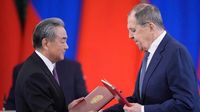On Saturday, May 10, 2025, tensions between India and Pakistan reached a critical juncture as both nations agreed to a ceasefire following escalating military actions. The announcement came amidst a backdrop of violence, with both countries exchanging fire across their borders, raising concerns about a potential full-scale conflict.
President Donald Trump confirmed the ceasefire agreement, labeling it a "full and immediate" cessation of hostilities. This development was characterized as a significant diplomatic achievement, attributed to US-mediated talks. Secretary of State Marco Rubio praised the decision, commending Indian Prime Minister Narendra Modi and Pakistani Prime Minister Shehbaz Sharif for their "wisdom, prudence, and statesmanship in choosing the path of peace." The ceasefire, described as a "bilateral arrangement," was critical in preventing further escalation after each side had attacked military facilities belonging to the other.
However, just hours after the ceasefire was announced, tensions flared again. The Indian government reported that Pakistan had violated the agreement, prompting Foreign Secretary Vikram Misri to state, "An understanding was reached this evening between the DGMOs of India and Pakistan to stop the military action that was going on for the last few days. For the last few hours, this understanding is being violated by Pakistan." This breach of the ceasefire agreement raised alarms about the stability of the newly reached understanding.
In a related development, China's Foreign Minister Wang Yi expressed his country's unwavering support for Pakistan during a phone call with Pakistani Deputy Prime Minister and Foreign Minister Ishaq Dar. Wang emphasized that China would stand by Pakistan in upholding its sovereignty, territorial integrity, and national independence. He acknowledged Pakistan's restraint in the face of escalating tensions, appreciating its responsible approach during challenging circumstances.
During the conversation, Dar briefed Wang on the evolving regional situation, highlighting the complexities of the current geopolitical climate. Wang reaffirmed China's commitment to Pakistan, stating, "China, as Pakistan’s All-Weather Strategic Cooperative Partner and iron-clad friend, will continue to stand firmly by Pakistan." This statement underscores the strong ties between China and Pakistan, especially in times of regional instability.
Separately, Ishaq Dar also communicated with UAE Deputy Prime Minister and Foreign Minister Sheikh Abdullah bin Zayed, who welcomed the ceasefire agreement. This interaction reflects the broader international interest in the stability of South Asia and the desire for peaceful resolutions to conflicts in the region.
The ceasefire agreement marks a significant moment in the long-standing conflict between India and Pakistan, which has been fraught with military confrontations and diplomatic standoffs. The latest escalation began with military actions that had seen both nations targeting each other's military installations, leading to fears of a potential war.
Despite the announcement of a ceasefire, the situation remains precarious. The violation of the agreement by Pakistan has raised concerns about the durability of the ceasefire and the potential for renewed hostilities. Observers are now watching closely to see how both governments will navigate this tense situation and whether they can restore calm.
As both nations grapple with the implications of the ceasefire, the international community continues to advocate for dialogue and negotiation as the primary means of resolving the long-standing disputes that have plagued the region. The role of external powers, particularly the United States and China, is also pivotal in shaping the dynamics of peace and conflict in South Asia.
In the days ahead, the focus will be on whether India and Pakistan can adhere to the ceasefire and engage in meaningful dialogue to address the underlying issues that have led to decades of conflict. The hope is that this ceasefire can serve as a stepping stone toward a more comprehensive and lasting peace in the region.




